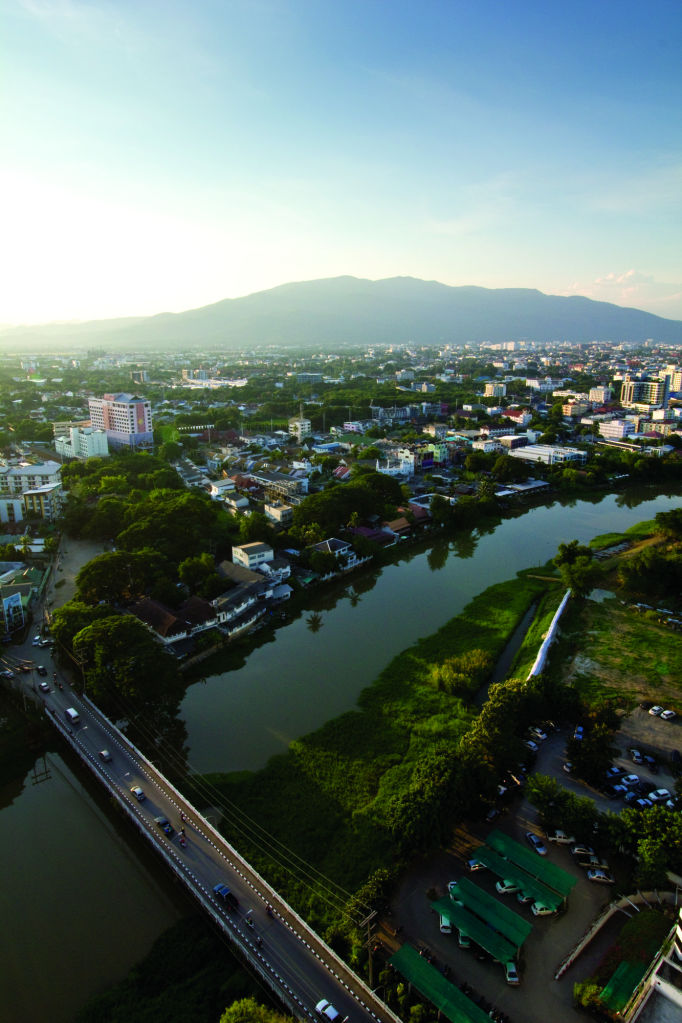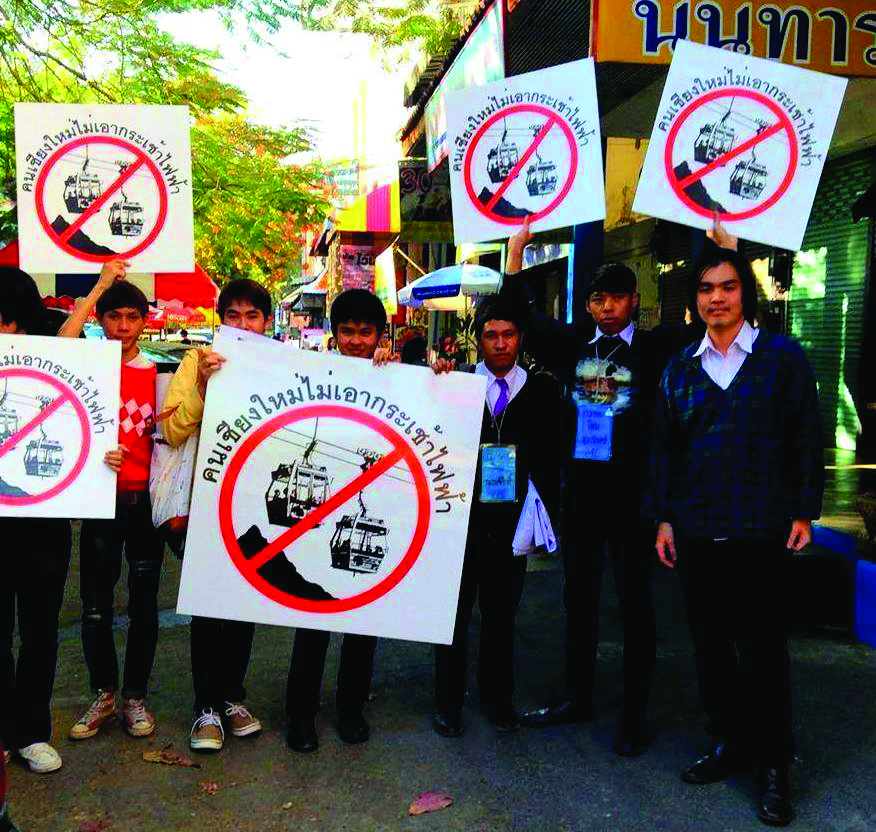Who doesn’t love Chiang Mai? We all say we do, but do any of us actually take care of our so called love? In the past it was frustrating for the average citizen lacking a voice or the power to affect change, but with today’s social media, we can all speak up. And amazingly, we are being heard, and even listened to! The more of us shouting together, the louder the message will be received by those who are hindering or can help.

However, awareness among the local public concerning our province’s environment and conservation is worryingly low. Therefore, education and creating awareness is much needed.
Raks Mae Ping or “Preserve the Ping River” was founded in 2013 as a communication project initiated by a group of people who foresee the worsening environmental scenarios occurring to, and along, the Ping River.
Raks Mae Ping views people as “software”, playing a more important role than the physical infrastructure or “hardware” i.e. sewage, roads, dikes, dams, etc. If the “software” works, then the city of Chiang Mai and its Ping River will become a more attractive place to live along, a better place to visit and to be enjoyed by all.
Raks Mae Ping’s mission is to create awareness among the people through print media (stickers, brochures, billboards), social media, the mass media, interviews as well as public participation (activities with school children, seminars with entrepreneurs, academic forums, cooperation with the authorities, etc.).
Since its inception, Raks Mae Ping has spoken up on behalf of the community on many issues that have caught the attention of the country’s media and created headlines leading to changes or improvement. Its purview has also expanded far beyond that of the Ping River to encompass many other environmental, developmental and infrastructural issues facing the city today.
Among its thousands of friends and followers, Raks Mae Ping is fondly called the “Whistle Blower” for its role as watchdog for the city’s development and related environmental issues.
At present, Raks Mae Ping has five active members who have been involved with its volunteer and social activities. However, according to Sakda Darawan, 58, the team leader and the administrator of the popular Raks Mae Ping Facebook, which has already maxed out its 5000 friends allowed on Facebook to start its new group page, both of which are receiving hundreds of comments and likes on a daily basis. “We are actually a ‘virtual organisation’. The fan clubs of Raks Mae Ping are at every corner and have joined in various activities without presenting the faces.”

With over 25 years’ experience in advertising, corporate design and communications for an international organisation as well as a long list of corporate clients; it is easy for Sakda, who only moved to Chiang Mai from Bangkok a few years ago, to pinpoint what is wrong, in terms of visual and management concerns, and strategise as well as mobilise in order to make a correction or improvement on the city. “I have been involved in communications from setting a clear strategy, design management, copywriting, speech and audio-visual impact and so on. Raks Mae Ping has been carried out with PR strategy in mind starting from its logo which was designed to create an impact with the onlookers.”
Since its inception, Raks Mae Ping has published pamphlets to raise awareness on how people can get involved with local issues, they have also visited schools to educate and volunteer, working with children and students on various environmental projects from reforestation to recycling.
Understanding that these issues are for everyone, Raks Mae Ping works with all spectrums of society. In fact, Sakda makes a point of visiting Chiang Mai’s governors regularly (there have been quite a few over the past few years), asking about what is being done as well as offering solutions to problems, and of course keeping up the pressure on authorities to perform for the sustainable good of the city.
Media savvy, Raks Mae Ping utilises numerous platforms for maximum effect, and in 2014 a documentary was shot by the group at the headwaters of the Ping River, 80 kilometres north of the city to disseminate a clearer idea to the general public about water resources. There has even been a music video produced by Mae Jo University’s Faculty of Information and Communications for the group, a rousing folksy song, aimed at getting the grass roots onboard with concerns for the river.

Media relations have been crucial to the group, with Citylife ourselves being in almost constant communication with Sakda, sharing information, swapping ideas and using one another’s resources in order to further the city’s interests. Understanding Thai media, Sakda is very adept at reaching out to the media and handing them a tidy story on a pretty platter ripe for going viral. For instance, Raks Mae Ping grabbed national headline news when it successfully campaigned against the proposed Doi Suthep National Park cable car project in late 2013, something Sakda says they are still keeping an eagle’s eye on as it is a big threat to the fragile ecosystem of the mountain. In 2014, when Doi Suthep Temple began construction on an odd looking observation tower which attempted to mimic the famed gilded pagoda, Raks Mae Ping took exception to the ‘alien’ design and managed to gather so much national press support that the temple not only scrapped future plans, but tore down the building within a month of the protest.
 Then there was the time last year when Wat Chedi Luang Temple commissioned new murals portraying classic deities holding, wait for it, rifles and guns, rather than the traditional swords. Raks Mae Ping took offence to the violent nature of the ‘art’ and had the abbot change the paintings within a fortnight of their unveiling. The group is having such an impact that a late 2014 post about Thailand’s deforestation received nearly 2000 likes and over 2000 shares on Facebook, the vast majority of them by locals.
Then there was the time last year when Wat Chedi Luang Temple commissioned new murals portraying classic deities holding, wait for it, rifles and guns, rather than the traditional swords. Raks Mae Ping took offence to the violent nature of the ‘art’ and had the abbot change the paintings within a fortnight of their unveiling. The group is having such an impact that a late 2014 post about Thailand’s deforestation received nearly 2000 likes and over 2000 shares on Facebook, the vast majority of them by locals.
When a group of restaurants opened up to serve food and drinks on public and natural waterways out of the city, the water quality was quickly affected. Raks Mae Ping blew their whistle and soon the Harbour Department announced that such operations were now illegal. In the past few people would have cared, with many complaining that their favourite weekend picnic spots would be ruined, but with the advent of social media awareness, the overwhelming support for this ban has been heartening.
If you recall, earlier this year Citylife started a campaign against the proliferation of signs in the city, Raks Mae Ping soon became an invaluable partner in this battle, reaching masses of local Thai readers who would otherwise not have been aware of the depth of this problem, and now gaining quite a bit of momentum on social media, achieving some results and responses by various authorities.
Activism can be planned and strategised, but to be fully effective, it has to be flexible, timely and allow for movement. And in this matter Raks Mae Ping has often been ahead of the curve. In 2013, a large group of bikers planned to ride up to an environmentally unstable area in the countryside. Unfortunately for them Raks Mae Ping learnt about this activity and within six hours was able to notify the project’s Facebook followers, spreading the information on environmental impact and eventually stopping the activity that would have been damaging to the environment. By creating awareness, the Raks Mae Ping Project was able to stop the potential disturbance to the villages and nature.
Sakda stressed that everyone is a stakeholder of the city and that we should all be caring about Chiang Mai’s movements and future. “If we ignore or pay just a little attention to the problems then we will reap what we have sowed in the end. Let’s do it together for a better Chiang Mai!” Sakda said.
What You Can Do
The business sector still needs reminders on conservation and environmental issues even though some of them are now more aware and getting involved with the so-called CSR, but many still think only in terms of trading for gain. Therefore, Raks Mae Ping would appreciate your participation, involvement and funding. Donation and support no matter how much or small can be sent to:
“Raks Mae Ping Project” Bangkok Bank, San Pa Khoi Branch
# 253-4-47823-1
Swift Code: BKKBTHBK
You can also send queries, reports or suggestions to: raks.maeping@gmail.com.
For more details, please visit:
Facebook: Raks Mae Ping
Raks Mae Ping Song: www.youtube.com/watch?v=zedppCZWqyo.